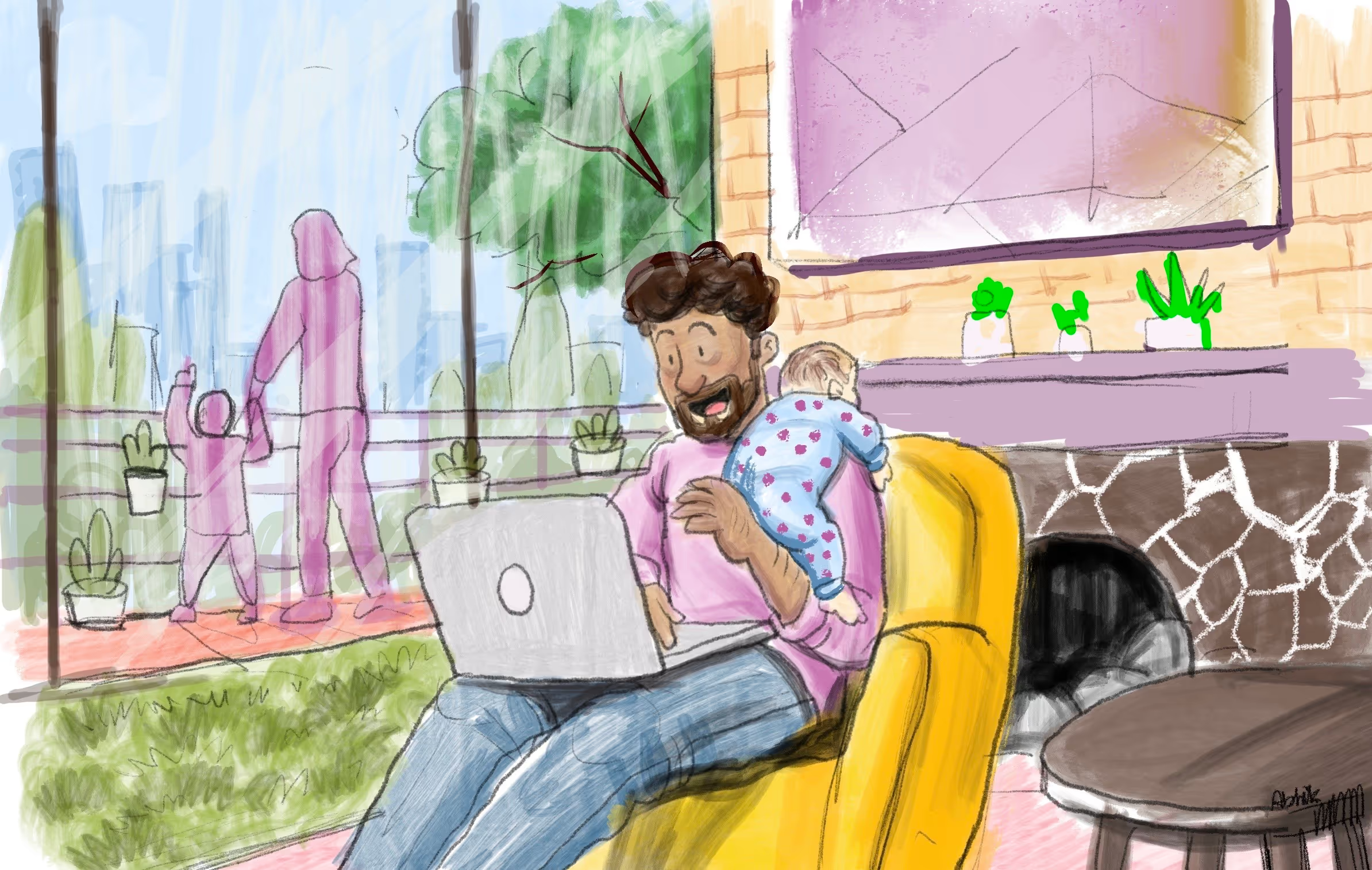
Since the beginning of history, fathers have played the same role: keep the family warm and safe, provide food, with minimal emotional contribution to the family unit.
Is that changing?
More than ever, men are keen to contribute at work and at home, especially after having seen from close quarters the burden of a double-shift on their partners during the pandemic. Millennial dads spend much more time with their kids than previous generations. In a 2017 survey of Indian dads, 1 out of 2 men said they would prefer more paternity leave over a pay raise.
Being a new dad can be tough and lonely.
The needs of the modern dad have evolved, but the support he receives hasn’t. Society and the workplace can do more to make it easier for men to be the dads they want to be. Some of the challenges include:
1. Fathers not fully utilising their paternity leave.
We assume men prioritize work over their kids, and data on paternity leave seems to confirm this assumption. Just one in six men take time off after the birth of their children, even when their company policy offers paternity leave (TimesJobs’ Fathers Day Survey 2017).
Why is that so? Men are worried about their ambition and their commitment to work being questioned if they take paternity leave. They also still shoulder the burden of the added financial costs that come with a baby. “It (fatherhood) is more difficult for men. You have the responsibility for one additional person's expenses. It took time for my husband to enjoy fatherhood. First came the responsibility and then was the joy of fatherhood”, says Nita, a first-time mom from Bangalore.
2. Men hesitate asking for parenting advice and have few dedicated support groups.
We all know that men struggle more than women to talk about how they feel and this has a huge impact on their well-being as dads. “As an engineer with a problem-solving mindset, it was hard for me to accept that I could not find a solution for a cranky baby - I had no idea what to do or how to respond." says Akshaya*, first-time-dad from Gurgaon.
Being a new dad is often a lonely road. When asked who they could turn to for parenting advice and support, 1 out of 3 expectant fathers said "nobody" (MGH Study, 2015). “I feel moms have more support groups and it is socially OK for them to ask for parenting advice. Dads have fewer people to connect with and talk about fatherhood fears and anxieties”, says Niraj* a first-time dad from Bangalore.
A quarter of men worldwide show signs of depression, three to six months after a baby is born. “I knew that my husband was struggling with the guilt of not being able to spend enough time with the baby due to his long work hours and travel. But I was in no shape to offer him support. I was battling my own demons postpartum. I was sleepless and exhausted myself, “ said Madhuri* a first-time mom from Mumbai.
Despite these challenges to the mental well-being of young fathers, they rarely seek or receive any specialized support to help them during the early fatherhood journey. In fact, less than 1% of organizations have any support for men to integrate work, fatherhood and self-care.
3. Societal perception of the role fathers should play.
The parenting role of millennial fathers has undergone a generational shift. But fathers are still perceived as substitute caretakers in the absence of the mother. Society still views the father’s primary role as - disciplinarian, provider and protector. According to a Flipkart survey of 1,700 men, 80% of fathers participate in school activities regularly, and half wouldn't mind being stay-at-home dads. However, this desire is currently overcome by the social stereotype of 'dads should just work'.
“There is a difference in the way people see and treat you as a dad - the baby and mom get all the attention and I am left to fend on my own,” shares Sanjay* a first-time dad - from Delhi. And it is not just at work, young dads are often ignored or overlooked at many stages of the fatherhood journey, be it the medical checkups during pregnancy or not being allowed to witness your child's birth. Young dads are often crowded out by the mom and the nanny!
Speaking from my personal experience, being a dad can somewhat feel like being the photographer at a wedding - everyone knows you are there but nobody pays attention to you. Even today I often feel like an outsider in the parents’ group since most of the social conversations are initiated by moms at parent-child(ren) meet-ups.
What do modern dads want?
Over the past two decades, the workplace has changed steadily for moms, though there's still a lot to do. I want to raise awareness of the needs of dads - the ‘other 50%’ of the parenting unit - to create gender-equal role models at both, work and at home.
To successfully drive change for modern-day fathers at work, people & culture leaders need to address a modern dad’s needs for specialized support and flexibility.
Here’s a list of easy wins that companies can implement to make a meaningful change for dads and the families they love.
- Parental Leave Policy – offer at least two-weeks paternity leave and encourage men to take it.
- Encourage and support the integration of work-family balance goals for men.
- Equal flexible work policies – normalize caregiving for both men and women.
- Provide specialized support and/or a forum in the workplace for working dads to share experiences.
* names changed for confidentiality


.svg)










.png)
.webp)

%20(1).jpg)
.png)



.svg)
